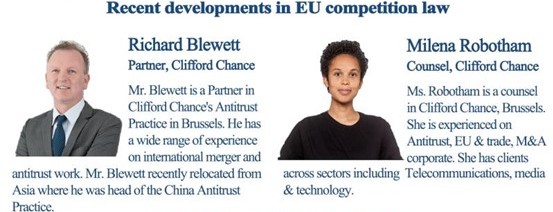
On June 2, 2021, the sixth lecture on the China-EU School of Law’s “frontiers of foreign-related legal practice” of the elective courses in Beijing was successfully held. The lecture was delivered by Mr. Richard Blewett, a partner from the well-known international law firm Clifford Chance, and Milena Robotham, a senior counsel from the same firm. Mr. Monty Silley, the European Executive Dean of the China-EU School of Law, served as the host. The topic of the lecture was “Recent Developments in EU Competition Law”. Ms. Griselda Qosja, from the European Consortium Office of the China-EU School of Law also attended this lecture.
This lecture consisted of 4 parts: An overview of EU Competition Law; Policy highlights; Recent developments in merger control; and trends in enforcement of Articles 101 and 102.
First of all, Mr. Blewett briefly introduced three pillars of EU Competition Law. They are respectively anti-competitive agreements (related to Article 101 TFEU), abuse of dominance (related to Article 102 TFEU) and anti-competitive mergers (related to Council Regulation (EC) No 139/2004).
Then, Ms. Milena Robotham and Mr. Richard Blewett together pointed out three policy highlights of EU Competition Law. The first highlight is that the European Commission (“EC”) issued the draft Digital Market Act, a legislative proposal designed to strengthen ex ante regulation for companies designated as “gatekeepers”. Once the proposal is adopted, gatekeepers will have to comply with certain obligations, including a duty to inform of planned merger (regardless of other notification thresholds), data separation and use obligation, interoperability requirements and prohibitions against self-preferencing.
The second highlight is the relationship between the European Green Deal (“EGD”) and competition rules. The effectiveness of applying legislative instruments (e.g. horizontal and vertical block exemptions, efficiency arguments and so on) is currently being reviewed by the EC to ensure their effective response to green challenges. In general, major changes to competition policy related to the Green Deal are unlikely.
The third highlight is the cooperation between the EU and UK after the Brexit. On one hand, the EU-UK Trade and Cooperation Agreement provides for cooperation on competition matters. On the other hand, EU competition provisions will continue to apply to UK companies if certain conditions are satisfied.
After that, Mr. Blewett introduced EU’s recent developments in merger control in great detail. The first development is how to regulate killer acquisitions. The EU encourages Member States referrals under existing Article 22 EUMR, even if they fall below national merger control thresholds. Mr. Richard Blewett gave further explanation by referring to the Illumina–Grail case.
The second development are some procedural issues in merger control. Mr. Blewett first analyzed 2 cases related to the supply of incorrect or misleading information and gave the risk warning, and then analyzed transaction structuring of merging parties and gun-jumping enforcement risks.
The third development are substantive issues in merger control. In the Three/O2 case, the court annulled the EC decision to block the acquisition of Telefonica UK by Hutchison UK because the EC did not meet the standard of proof in merger assessment. To be specific, the reason that a merger would result in 4 to 3 change in a concentrated market cannot in itself lead to the conclusion that the transaction would cause lasting harm to competition which would, as such, be liable to constitute a significant impediment to effective competition. The EC should produce sufficient evidence to demonstrate with a strong probability that a concentration gives rise to harm, and this lies between a balance of probabilities test and a requirement of proof beyond reasonable doubt.
In the end, Ms. Robotham analyzed the trends in enforcement of Articles 101 and 102. The first trend is the identification of the nature of product denigration in the pharmaceutical sector. The French Competition Authority has found statements disparaging a competitor pharmaceutical product to be an abuse of dominance, where the information is disparaging (but not even necessarily incorrect), expressed in a manner that lacks objectivity, and where the disparaging information is liable to affect the structure of the market. An EC Report on enforcement in the pharmaceutical sector treats as given that product denigration in certain circumstances constitutes anticompetitive conduct. The second trend is the use of settlements and interim measures. Ms. Robotham held that the use of commitment decisions to bring abuses of dominant position to an end are likely to become more common. Interim measures enable the EC to order a company to stop conduct immediately (i.e. prior to full investigation) where there is a prima facie finding of infringement and urgency due to serious and irreparable harm to competition.
In the question-answer period which followed, students raised various questions, including whether there is difference of the definition of killer acquisitions in the pharmaceutical sector and in the platform technology sector, as well as the identification of what may constitute a gatekeeper. Both Ms. Robotham and Mr. Blewett gave their patient and detailed explanations. Finally, Mr. Silley summarized the lecture, and the lecture ended successfully with words of appreciation from the students.
Text by Song Tingting (CESL double master student from 2019 intake)
